

Silent House by Orhan Pamuk. ShareThis Silent House by Orhan Pamuk Review by Deborah Helen Garfinkle — Published on June 11, 2013 Tags: postmodern fiction, Turkish fiction, vintage Silent House by Orhan Pamuk (trans. by Robert Finn).
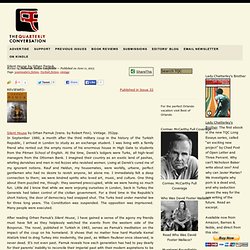
Vintage. 352pp. Published in Issue 32 In September 1980, a month after the third military coup in the history of the Turkish Republic, I arrived in London to study as an exchange student. After reading Orhan Pamuk’s Silent House, I have gained a sense of the agony my friends must have felt as they helplessly watched the events from the western side of the Bosporus. A Short Guide to Murakami’s Short Fiction. ShareThis A Short Guide to Murakami’s Short Fiction Essay by Matthew Tiffany Tags: Haruki Murakami, translation Published as part of the Murakami Roundtable The Elephant Vanishes by Haruki Murakami.
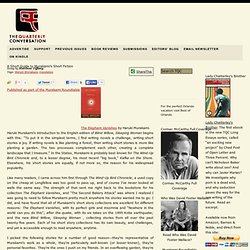
Haruki Murakami’s introduction to the English edition of Blind Willow, Sleeping Woman begins with this: “To put it in the simplest terms, I find writing novels a challenge, writing short stories a joy. Like many readers, I came across him first through The Wind-Up Bird Chronicle; a used copy on the cheap at Longfellow was too good to pass up, and of course I’ve never looked at wells the same way.
I picked the following stories for a number of good reason—they’re representative of Murakami’s work as a whole, they’re particularly well-known (or lesser-known), they’re personal favorites. The Second Bakery Attack. Time oozed through the dark like a lead weight in a fish’s gut. This is one of the first short stories I read by Murakami. The Kangaroo Communique. It’s a great story. Honey Pie. About. No Funny Business: How Orhan Pamuk’s Postmodern Fictions Fall Short.
ShareThis No Funny Business: How Orhan Pamuk’s Postmodern Fictions Fall Short.
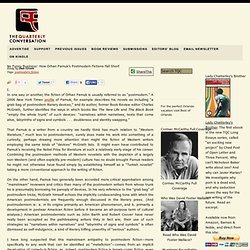
John Fowles. John Robert Fowles (/faʊls/; 31 March 1926 – 5 November 2005) was an English novelist who earned an international reputation, with his books translated into numerous languages, and several adapted as films.
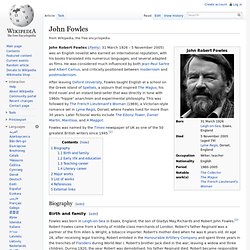
He was considered much influenced by both Jean-Paul Sartre and Albert Camus, and critically positioned between modernism and postmodernism. Fowles was named by the Times newspaper of UK as one of the 50 greatest British writers since 1945.[1] Biography[edit] Peyami Safa. Sait Faik Abasıyanık. Literary theory. Literary theory in a strict sense is the systematic study of the nature of literature and of the methods for analyzing literature.[1] However, literary scholarship since the 19th century often includes—in addition to, or even instead of literary theory in the strict sense—considerations of intellectual history, moral philosophy, social prophecy, and other interdisciplinary themes which are of relevance to the way humans interpret meaning.[1] In humanities in modern academia, the latter style of scholarship is an outgrowth of critical theory and is often called simply "theory.
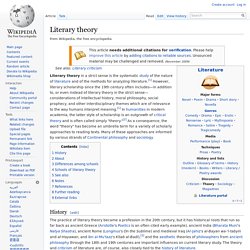
"[2] As a consequence, the word "theory" has become an umbrella term for a variety of scholarly approaches to reading texts. Many of these approaches are informed by various strands of Continental philosophy and sociology. Haiku. Millî Edebiyat. Cumhuriyet dönemi Türk edebiyatı. Post-structuralism. Post-structuralism is a label formulated by American academics to denote the heterogeneous works of a series of mid-20th-century French and continental philosophers and critical theorists who came to international prominence in the 1960s and '70s.[1][2][3] A major theme of post-structuralism is instability in the human sciences, due to the complexity of humans themselves and the impossibility of fully escaping structures in order that we might study them.
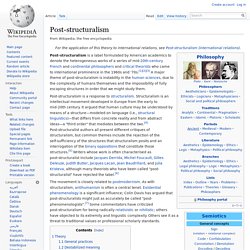
Post-structuralism is a response to structuralism. Structuralism is an intellectual movement developed in Europe from the early to mid-20th century. Theory[edit] Glossary of literary terms. Byronic hero. That man of loneliness and mystery, Scarce seen to smile, and seldom heard to sigh— (I, VIII) and He knew himself a villain—but he deem'd The rest no better than the thing he seem'd; And scorn'd the best as hypocrites who hid Those deeds the bolder spirit plainly did.
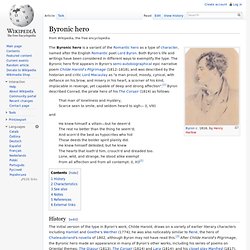
He knew himself detested, but he knew The hearts that loath'd him, crouch'd and dreaded too. Lone, wild, and strange, he stood alike exempt From all affection and from all contempt: (I, XI)[2] History[edit] List of literary movements. This is a list of modern literary movements: that is, movements after the Renaissance.
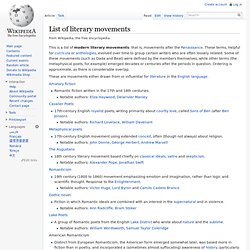
These terms, helpful for curricula or anthologies, evolved over time to group certain writers who are often loosely related. Some of these movements (such as Dada and Beat) were defined by the members themselves, while other terms (the metaphysical poets, for example) emerged decades or centuries after the periods in question. Ordering is approximate, as there is considerable overlap. These are movements either drawn from or influential for literature in the English language. Postmodern literature. Postmodern literature is literature characterized by heavy reliance on techniques like fragmentation, paradox, and questionable narrators, and is often (though not exclusively) defined as a style or trend which emerged in the post–World War II era.
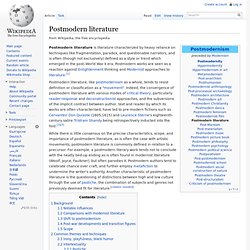
Postmodern works are seen as a reaction against Enlightenment thinking and Modernist approaches to literature.[1] List of postmodern writers. Beat Generation.